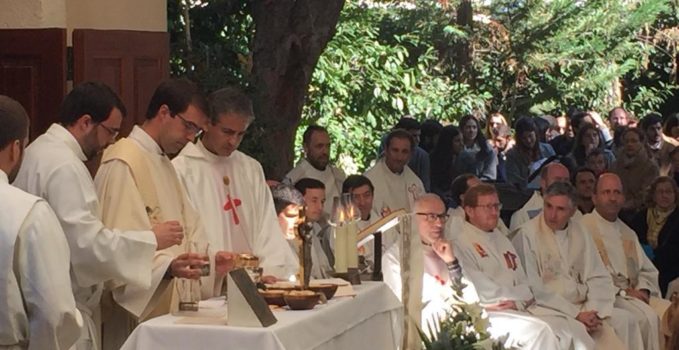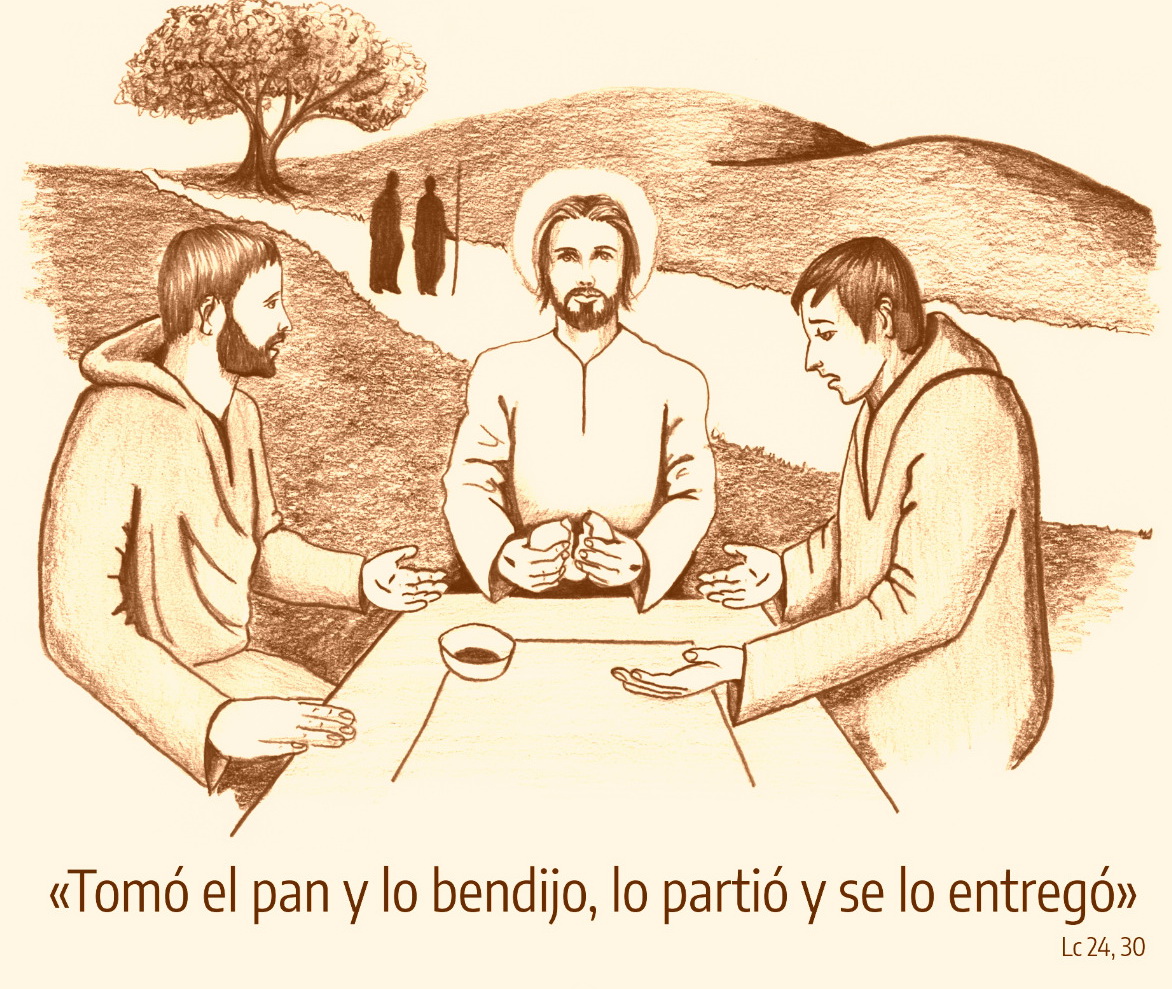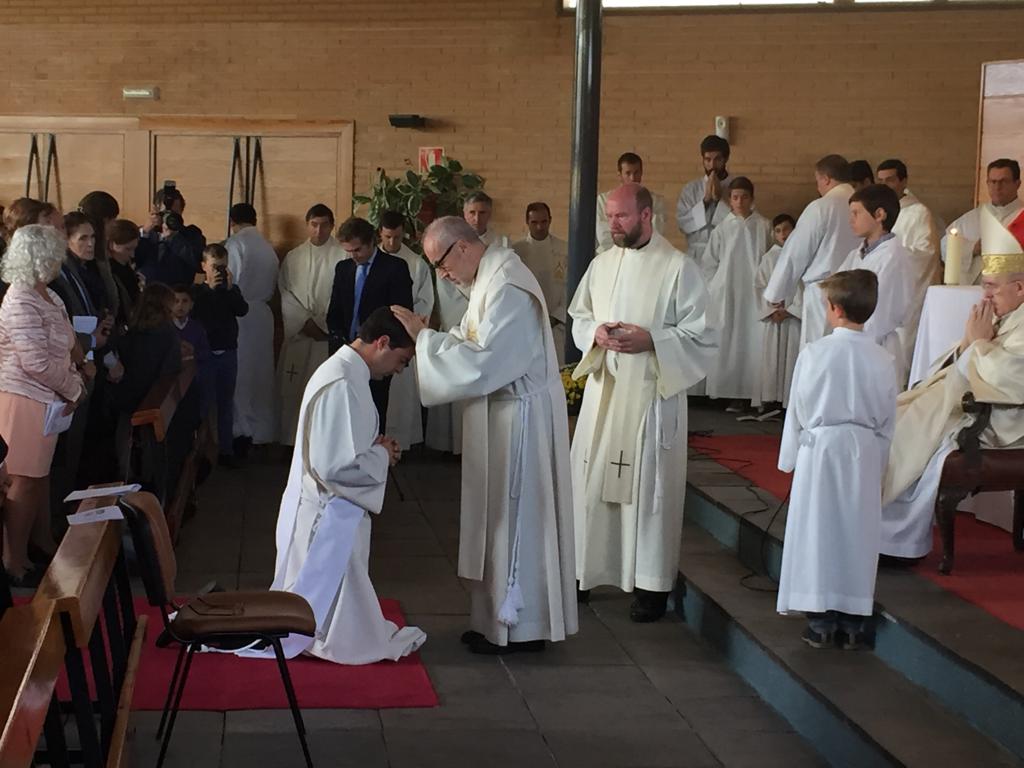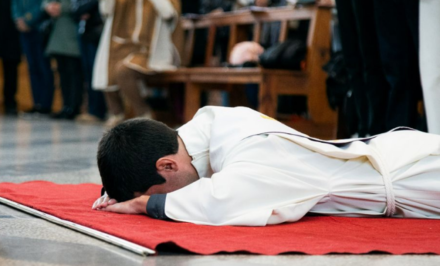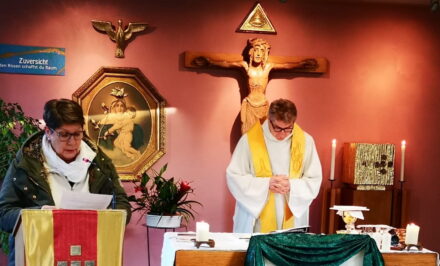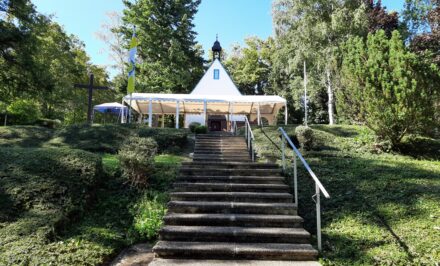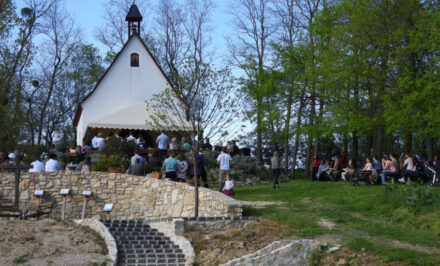SPAIN, Juan Zaforas and Maria Fischer
“We could stay in these common places, our clichés, but they do not touch the essence of our priesthood. When do they become real? When do they enter the hearts of those called? When do they really enter your heart?” asked Fr. José María García in the homily during Fr. Eduardo Segura Bueno’s first Mass, on 4 November 2018, in Madrid’s Schoenstatt Shrine. He was encouraging him and all to be “free and brave, faithful witnesses to serve others.” —
The day after Fr. Eduardo’s priestly ordination was an emotion-filled moment in the presence of many Schoenstatt Fathers, the new priest’s relatives, friends, and members of the Schoenstatt Family. In a very personalized homily, directed at Fr. Eduardo, Fr. José María left a message of hope for the priesthood and the mission of the priest, taking from the symbol of bread, which Fr. Eduardo chose for his priestly motto: “The Lord holds bread in his hands. You are that bread.”
“Additionally we have the privilege in the priesthood, which we receive and in which the Blessed Mother educates us, that it is a priesthood with a witness behind it. That witness is our Father and Founder. He was a man who was brave and free to be free. Ask him to give you that freedom for whatever, in the Will of God, and that bravery which allows you to be disposed for all, including for that cross, which sometimes life asks you to bear.
Free and brave
Faithful witnesses to serve others
He took the bread, blessed it, broke it and gave it
Thank you for embodying it.”
Here we publish the complete text of Fr. José María García Sepúlveda’s homily, Madrid, in the first Mass of Fr. Eduardo Segura Bueno
Homilía, P. José María García Sepúlveda (pdf)
Fr. José María García Sepúlveda’s homily, Madrid, in the first Mass of Fr. Eduardo Segura Bueno
Sunday, November 4, 2018
Schoenstatt Shrine of Madrid (Serrano Street)
Gospel (MK 12:28 – 34)
Actually this about being the oldest here that has its privileges… but also its responsibilities. In fact, it was a very pleasant surprise, but truly moving, that you would ask me if I would dare to take your first Mass or that you wanted me to take your first Mass. You’ve left me very worried…(laughter).
The readings we’ve heard and today’s Gospel speak to us of something that will happen to you a lot throughout your priestly life. Many are going to approach you, asking you for the way to the Lord, for the way in life. And you are going to give sensible responses…that common sense, undoubtedly, with which you have formed in yourself for so many years…that common sense which also comes from your own maturity as a person.
Although this brings us close to the Kingdom of Heaven, we know well it’s not enough. Common sense is necessary, but it’s not enough to be in the Kingdom of Heaven.
To live in that fullness for which God has created us, we need to go a step further. That step to which the Lord invites us on Holy Thursday is the step of the new commandment: “Love one another as I have loved you.” This is what allows us to be in the Kingdom of Heaven, not close by but in the Kingdom of Heaven. And for that is the reason the Lord calls his church, He calls priests so that the love of the Lord translates into announcing the Good News, in going out to encounter those who suffer as you have done during this entire time of your formation…liberating oppressed hearts, healing wounds…but that’s only feasible when we love, when we’re capable of loving as the Lord loves us.
This, we’d say, is what is common about the Christian priesthood. We all know this, and we could stay in these common places, in our clichés that touch the essence of our priesthood. When do they become real for us? When do they enter the hearts of those called? When do they really enter your heart?
Our Father and Founder always told us that each generation has to found anew in order that that the community can be renewed in the Spirit, so that it can be effective, so that it can be fruitful, but faithful to the origin, going through your heart, surrendering to mankind.
And so, it is founded anew. Thus the Church is always youthfully vigorous. We live in challenging times; we live in difficult times. We live in times where the Church is being crucified even in her own sins. And we can withdraw ourselves, we can get complexes, we can somehow become intimidated by fear facing that forcefulness. Yet nevertheless, precisely this is where our strength press forward is.
In taking on our smallness, in taking on our weakness is exactly the place that the Church can be renewed; the Church is that instrument in the hands of the Lord that announces the Good News, like the disciples at Emmaus after their encounter with the Lord. From giving joy and hope to mankind in spite of having gone through a moment of insecurity, confusion, or pain because they were very aware of Peter’s sin, they were aware of Thomas’ weakness, and so many others…including Judas himself! Yet nevertheless, they go out to announce the Good News.
And that’s the door that leads them to liberate oppressed hearts, to give hope and joy, as I said before. But it entered their hearts. And that is our vocation; that is what it is all about. To live, we could say, in that profound experience of the love of God, of that love of Jesus in us which allows us to sow hope and to renew our Church that we love passionately to the point of surrendering our life for her.
This is Church…it’s this community of believers…it’s these people who gather around the altar, precisely to allow God to love them, to allow themselves to be transformed by God, to allow God to heal them, to allow ourselves to be touched in our most profound wounds because in that taking on of our wounds is also where we can grow as God’s instruments. This is what it is all about.
How’s this experienced? How do, let’s say, these priests live this reality?
You have given it to us clearly. I was telling some of you this morning that I’m not creating the homily; you do it. You are the homily that the Lord gives to us. And He has given it a name. And you said it to us very clearly yesterday. Your homily is “He took the bread, blessed it, broke it and gave it to them.” That is the homily that the Lord gives to us today, the day of your first Mass.
And what does this mean? Well surely to be this priest who brings hope, joy, confidence in a church, who lives in a real world…How do we do it? “He took the bread, blessed it, broke it and gave it to them.”
And this is the mystery of the priest. That from this day on, Jesus will be in your hands, but you also will be bread in Jesus’ hands. Yesterday you said it at the moment you gave thanks: “I am bread in the hands of the Lord.”
This is the mystery of the priest—Jesus in my hands and I in the hands of Jesus— to be bread. And this is exactly what brings us today to accompany you with profound joy because you have had the courage to say, “I want to be bread. I feel called to be bread in the hands of the Lord because the Lord is bread in my hands.”
And that bread which the Lord takes is bread which has been wrought over thirty some odd years. Bread that was formed there, in that…as they used to say, in that first seminary. Today using the image of bread, we would say, like “the original bakery.” Eduardo and Angeles made the bread. There is a beautiful gesture that we saw yesterday. Your parents brought you the vestments; they offered you. The offering is real, therefore our gratitude to you two is that you have brought your bread, and that bread is this. It is the bread you have offered, the bread you have kneaded for years… that you have gestated as the fruit of your love… that you have carried in your body and in your soul…that you have carried in your heart. And therefore our gratitude. Because if there are no families who gestate bread, who love bread, there are no priests…there is no bread to be offered. Therefore profound gratitude to the two of you.
Evidently grace is behind this, and that grace was what you gave to each other in the moment of your marriage. And the fruit is this bread. It is the bread being offered.
And the Lord took that bread
The Lord took that bread yesterday. And yesterday you felt, you experimented, you heard— finally —the calling. That calling which you were able to have in your heart, in that inner conviction, but which was always between the contrast of light and shadows of faith. And yesterday you heard it. “Eduardo Segura.” “Here I am.” That’s the calling that the Lord makes to you by means of the Church. And it’s a blunt calling. It’s a clear calling. And you responded in the same way.
The bread was called. The Lord took it. You said YES. And that bread went on to be bread in the hands of Jesus. And it is that image which you have there. Therefore that very original image you have is your stole. Let’s say that I know who is there, but what is central, what remains very clear is that the Lord has bread in his hands.
You are that bread.
And that will be the mysticism with which you are going to live your priesthood everyday. The Lord takes you, and He is going to take you everyday, from morning till night. Bread to be consecrated. He took the bread and blessed it.
How does the Lord bless you? How is He going to bless you everyday? As He has done it until now, by means of His Church. You received the blessing from the Church. And that Church is not only the official blessing which Don Carlos gave you yesterday, that consecration which he gave you, but that blessing which is going to make you a priest throughout your life. Because that bread which you received from your family is going to be priestly bread in the measure in which you come to be nourishment for all of us, that you allow yourself to be touched by all of us.
This community will make you a priest and will mold your priesthood. How did the community do it, that “bake you” in so many places? In Paraguay, how about that heat…they really baked you already; in Chile, with all that goes with that; in those places where you served, they were baking you there. But the bread that the Lord bakes for you is always fresh bread; it is always bread that is going to go through the oven of benediction that you are going to receive through the Church everyday. Therefore the disposition to be open to the blessing.
You have a gift, but it’ll make you fruitful according to the measure in which those whom the Lord entrusts to you bless it. You are going to be a priest of the Church, but the real Church, of that concrete Church with a face, with wounds, with blessings, but also a Church that needs liberation from its fears. Let yourself be touched by Him because that is where you will have the blessing.
Also not only will it bless you, but it will also break you. Why? Because the blessing wants to be shared. Therefore it breaks by breaking you in some way. There is no use of a power like that, which God gives you, without what we call the ascetic of power. That is to say, to allow yourself, in some way, to break in order that you do not feel all-powerful, but what is the essence of the priest: a Server. Server and witness.
But for that we have to break everyday. To break in this dryness which there is and to break in humility, from knowing how to assume the injustices ourselves, from knowing how to assume the incomprehension in ourselves.
Yesterday you made a gesture you are going to repeat, hopefully, every Holy Thursday. It is a gesture that defines us and is touching, because it is so strong. Do you know which one it is? Prostration. That is breaking oneself. That is annihilating oneself. It is the annihilation of Christ alive in you. And afterwards, precisely, to surrender yourself. Because when we break, that’s when we can surrender ourselves. It’s there where we can share ourselves, where we can have sensitivity for everyone, especially with those who suffer.
This has always been a mystery, at least for me; this about the Lord loving you in those most in need, but it’s also true that in suffering is where we have a greater feeling of reality. But also in that suffering which enters into the love of God, because that is how Christ loves us, that is where the fruitfulness of our priesthood is.
You will be taken everyday.
You are going to be blessed everyday.
You are going to be broken everyday.
And you are going to be shared everyday.
Why? Because it is the same you are going to do with Christ.
He, in a gesture of total humility, will become bread in your hands.
What for? So that you can bless Him. Yes. You bless that bread and with your blessing you see that that bread becomes Eucharistic bread so that you may break it and share it.
Christ in your hands, you in the hands of Christ
And there are two moments that hopefully will always move you. In the moments where this communion become full, a moment where, to say it like this, our priesthood has reason to be, where it has that entity which soaks us up to serve others as witnesses of the love of Christ.
And it’s the moment in which you say, “This is my body.” And it will be Christ who speaks in you, but it will be you who also speaks in Christ. Because you will also be that bread. If not, there’s no reason to win the hearts of the people. You are called to surrender your body for them. And the conviction, the love you place on this, will be the nourishment for many. This is my body.
And also the other which moves much more, and is the moment of forgiveness: “And I absolve you of all your sins.” That “I absolve you” we know well is Christ, but also passes through your forgiveness. You as a priest have to pardon. You as priest are called to assume the sin of the other, the pain of the other that opens up to you. And make it your own. If not, we fall into the magical, and that does not transform. Assume it bravely. Assume it with something that goes beyond common sense, of which today’s Gospel spoke to us. It is that Kingdom of God which passes by getting totally involved.
“This is my body” and “I absolve you.”
The Blessed Mother accompanies us in all of this because she is your Queen; she is your educator. She is the one who will take care that the bread that your parents offered continues being fresh bread, continues being appetizing, a credible bread, an attractive bread. Why? Because she never stops educating us, never stops forming us.
Besides we have the privilege that this priesthood which we receive, and in which the Blessed Mother educates us, is a priesthood with a witness behind it and that is our Father and Founder. He was a man who was brave and free, for being free. Ask him to give you that freedom for whatever, in God’s Will, and that bravery which allows you to be disposed for others, including for that cross, which life can sometimes have you bear.
Free and brave.
Faithful witness to serve others.
He took the bread, blessed it, broke it and gave it.
Thank you for embodying Him.
Amen.
Original Spanish, November 18, 2018. Translation: Carlos Cantú, Austin, Texas USA. Edited: Melissa Peña-Janknegt, Elgin, TX USA


